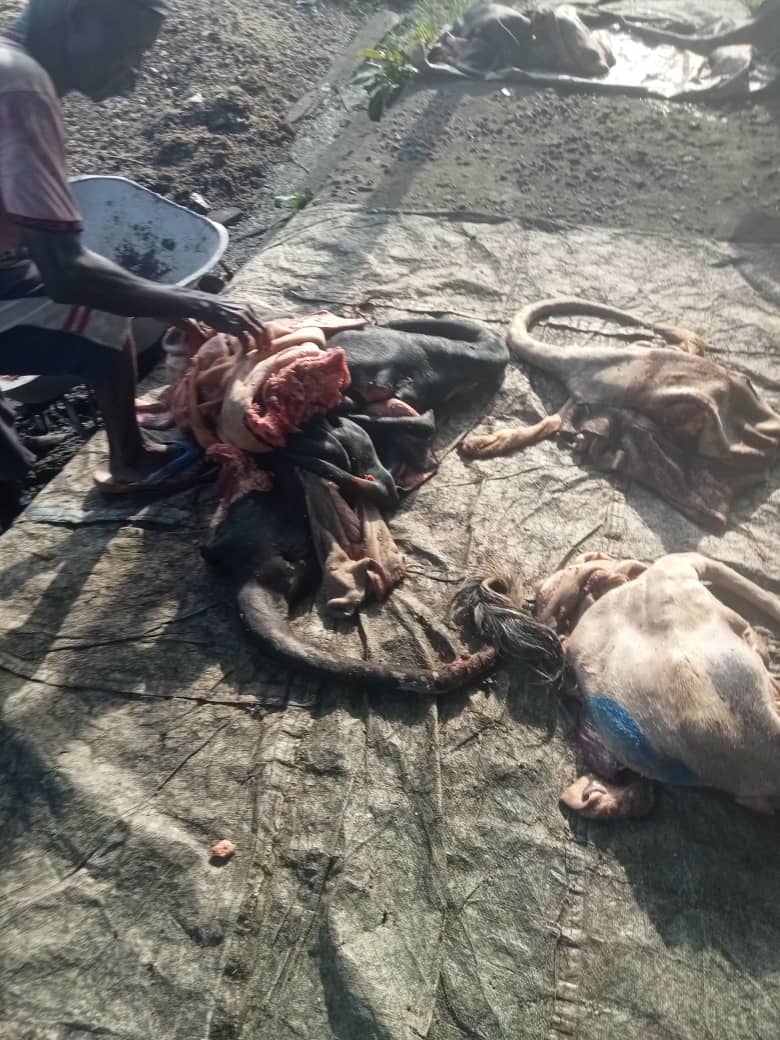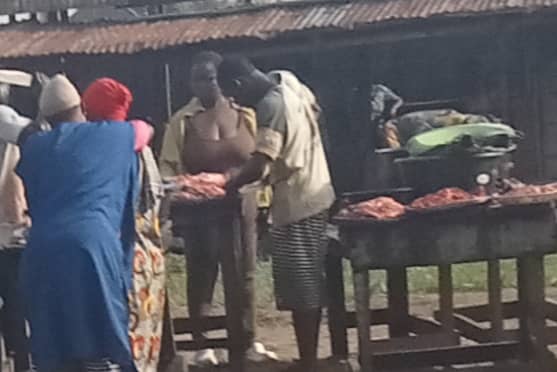Abattoirs in Nigeria, the very places where meat for millions is processed—often operate in shocking squalor. A visit to slaughterhouses in some parts of the country reveals disturbing and unsanitary conditions, raising urgent public health concerns. Osehobo Ofure (Benin) and Beatrice Gondyi (Bauchi) report.

Flies swarm over pools of congealed blood. Rotting animal parts litter the ground, while butchers hack meat on grime-caked floors, seemingly unfazed by the stench of decay. This is the grim reality of Nigeria’s slaughterhouses: poorly regulated, dangerously unsanitary, and unchecked—a marketplace where profit outweighs safety, leaving consumers to bear the consequences with every bite.

With no routine veterinary inspections, diseased animals are slaughtered alongside healthy ones, while contaminated tools and filthy water spread pathogens with every cut. The lack of basic hygiene—no handwashing stations, no proper waste disposal, and no enforcement of safety standards—turns these abattoirs into ticking health time bombs. The neglect by government of these facilities is not just an embarrassment, it is a public health disaster.
The porous borders between Nigeria and neighboring countries, as well as lax controls within states, have created a dangerous pipeline for diseased cattle to enter the Nigerian market. Without proper veterinary checks or quarantine measures at entry points, sick animals from Chad, Niger and Cameroon routinely mix with healthy livestock, spreading infections undetected.

Experts have estimated that the Nigerian livestock industry operates below 3% capacity, with unsafe meat causing annual losses worth millions and preventable disease spread.
A recent investigation carried out by Spear News exposes the horrifying conditions inside Nigeria’s abattoirs, where business takes precedence over conscience—where every cut of meat carries unseen risks, and the public bears the burden of this reckless trade.
From the rearing of animals to their final moments in the abattoir, the unseen journey of meat processing is a vital chain that should guarantee safety and quality for consumers. Yet in most parts of Nigeria, this system is broken. Behind the grim walls of the nation’s slaughterhouses, a different story unfolds—one of neglect, indifference, and peril.

Findings by our reporters in Bauchi and Edo, reveal a horrifying truth: animals arrive at abattoirs already sick, exhausted from gruelling journeys, or even slaughtered illegally before they are taken to slaughterhouse. Some are heavy with unborn calves, their lives ended not out of mercy, but convenience.
When Spear News interviewed Muktar, Director Planning Research and Statistics of Bauchi State Environmental Protection Agency, he explained that the safety is a collaborative effort between the agency, Livestock Ministry and Bauchi Local Government to ensure safe and best practices are adhered to. To this end, they have assigned environmental health officer stationed at the abattoir.
“We do not allow unwholesome practices”, he said but the stories are different from what our reporter met on ground.
Abubakar Muncigari, Chief Security Officer of the Bauchi Butchers Association, admits openly:
“In this abattoir, we slaughter pregnant cows. When they are sick and cannot deliver on their own, like women in labour, they become too weak to survive. They are a burden, so we must put them down. We have veterinary doctors who check the meat for diseases like cancer. If the sickness is severe, the animal is buried. But those weakened by long journeys—what we call ‘mazauka’ in Hausa—are still slaughtered. Their sickness is just stress, thirst, exhaustion… it is not real disease.”
His words lay bare a chilling reality: in Nigeria’s abattoirs, life is cheap, rules are bent, and profit comes before safety. While officials claim oversight exists, the truth is far darker. Animals collapse from dehydration, their meat stamped as fit for sale. Pregnant cows, too weak to stand, are butchered without a second thought.
He said, “there are a number of factors to consider, veterinary doctors are available to certify the safety of the meat, to give us orientation on health and safety measures, the different zoonotic diseases. We have doctors who check first before a pregnant cow is slaughtered”, however the scaring part is that despite some regulations measures put in place, sick animals are still slaughtered for public consumption.
“The government has provided veterinary doctors for us in this abattoir, and the check the meat for cancer and ailments that affect the animals, before public consumption, if they found out it’s sickness is serious, the animal will be buried and won’t be allowed for the public to use. Also those that are sick too are slaughtered they are called mazauka in hausa, their sickness is mainly due to the long journeys they endured before they are brought to slaughter house, they will be thirsty and dehydrated, so this is not really a sickness but it is just stress”, said Abubakar.
He said their major “challenge is the lack of government intervention”. “Mostly, the assistance is only on paper, and the road to the abatoir is in a deplorable condition. You follow the road and you saw how terrible it is. This kwata is over 35 years and still there is no access road, we need solar Borehole as we don’t have water, water is a problem, said Abubakar who appealed to the government to come in and esure that things are done properly to safeguard public health. 25 under us but upto 1000 depending on who is slaughtering.
Abubakar Mai Jama’a, a revenue collector at the Bauchi abattoir, reveals the harsh realities of their operations. He said, despite being the headquarters and revenue generated daily, the facility grapples with crumbling infrastructure- no access roads during rains, chronic water shortages, and a borrowed generator barely keeping operations afloat. Butchers struggle with dwindling capital while the union shoulders half the cost when a member’s animal dies, despite inadequate revenue to cover such losses.
Desperation dictates practices: sick and pregnant cows are routinely slaughtered to avoid total loss, with some animals butchered mid-transport at the first sign of illness. Mai Jama’a insists this poses no health risk, claiming all meat undergoes veterinary inspection and diseased portions are discarded. Yet his admission—”These days we hardly get unhealthy cows”.
His words: “We butcher pregnant and sick cows to prevent them from dying. Infact, as the cows are being conveyed to the abatoir, if we noticed any ill health, the cow can be slaughtered before it gets to the destination. There is no harm in consuming such meat. Any where you slaughtered your cow you must bring it here for proper inspection because we have doctors here. If any part is diseased it will not be allowed into the market. These days we hardly get unhealthy cows”.
For Musa Sallau, it’s a question of survival—even if it means selling a sick cow, he must put food on the table for his family.
“There is still profit in the trade, but barely. On a good day, we might take home up to 3kg of meat. The business is struggling now—what used to buy four cows barely covers one these days, leaving many of us unable to afford stock. Our plea to the government? Provide jobs by having public institutions buy directly from us”, he told Spear News.
Veterinary Chief Exposes Nigeria’s Meat Industry Crisis: Rampant Illegal Slaughter, Weak Laws and Billions Lost
Dr Abubakar Mohammed Tilde, Chairman of the Nigerian Veterinary Association in Bauchi State, in an interview with Spear News, revealed the alarming gaps in Nigeria’s meat safety system. He explained that while the state abattoir conducts pre-slaughter inspections, most butchers bypass regulations, illegally slaughtering animals at home—a practice banned globally yet rampant due to outdated 1960s laws with negligible penalties.
He said the the absence of border control posts enables diseased cattle influx and cattle rustling, while uneducated butchers prioritise quick sales over ethics. Dr Tilde estimates the livestock industry operates below 3% capacity, with unsafe meat causing annual losses worth millions and preventable disease spread. He calls for urgent public-private partnerships to modernise infrastructure, enforce stricter penalties, and revive border checks to salvage an industry where illegal practices now outweigh lawful operations.
“Bauchi State abatoir is a big environment where healthy animals are taken days before slaughter for proper inspection. Veterinary inspectors check for hazardous diseases, for the animals to be either treated or slaughtered. We don’t have abattoirs in the state. Most of the butchers are not educated in terms of adhering to ethical standards they just want to sell.
“The state border controls is non existent. It is at the control borders that you check for any ailment or other issues. Lack of border post also contributed significantly to cattle rustling because there are no checks, we should advocate for the border control post to be brought back. There are a lot of unethical practices going on, most of the butchers do it before it reaches the abattoirs, there is nowhere in the world that you slaughter your animal at home before taking it to the the market except here.
“Lawfully this is not allowed, this practice incur huge losses to the industry, Laws concerning this needs to be updated, these laws have been been in existence since the 60s, there is no significant penalty, there is need to change. The livestock industry doesn’t tap 3% of its potential. Unsafe meat runs in the million as losses annually and this diseases can be treated within days but they will prefer to sell it at giveaways which affects health and economy. There should be a public private partnership. The private sector should come in to help in sanitising the sector. The major challenge is the lack of infrastructure in the meat industry, he Dr. Muhammed.
The scene in Edo State mirrors a grim national crisis. Across Benin City, the state capital, slaughterhouses are all over, some government owned, others privately owned- operate daily, supplying meat to unsuspecting consumers. But behind the commerce lies a story of institutional neglect.
Near the Ikpoba River’s swamps stands one of the state’s oldest public abattoirs, a crumbling relic from the 1960s. Here, cattle bleed out on filthy concrete as barefoot butchers, unprotected and unregulated, hack through carcasses. The facility’s borehole lies abandoned, forcing workers to haul water from nearby homes – water that inevitably mixes with blood, dung and maggots festering in open pits. Rusted hooks dangle above mountains of discarded entrails, occasionally scavenged by local farmers. Even the abattoir’s Cold Room, installed decades ago, stands padlocked, another casualty of Nigeria’s chronic power failures.
Sunny Omokaro, National President of the Butchers’ Employers Union, revealed the bitter irony: while the abattoir generates N1,000 per cow for local local government, not a kobo is reinvested. The council collects its dues as maggots writhe beneath workers’ feet, as consumers unknowingly buy meat processed in conditions that would shutter facilities in saner societies. Edo’s abattoirs aren’t just failing – they’re being failed by those paid to protect public health.
“We have made several representations to the council on this matter without any response beyond empty promises. It is a very pathetic situation,” Omokaro lamented.
Bright Omokaro, a butcher with over three decades of experience, explains the process: “Once the cow is brought in, a Muslim is present alongside a veterinary doctor who inspects and approves the cow for slaughter. The Muslim offers prayers and slaughters the cow, after which the veterinary doctor inspects it again before it is butchered.”
On what happens if an animal is declared sick or pregnant, he said, “If it’s sick, we kill and bury it. We even pour chemicals over it to ensure no one exhumes it to sell to unsuspecting members of the public.”
Kingsley Balogun, Secretary of the Butchers, emphasized the critical role of veterinary doctors. “Without them, meat cannot be slaughtered or sold for public consumption,” he said.
He recounted an incident where a woman complained about meat swelling in her pot. “When she told us, we asked where she bought it. She admitted it was from the roadside. We told her we couldn’t help because it wasn’t from us. Meat from licensed abattoirs is 90% safe. People should shun roadside meat and illegal abattoirs.”
An official of the Edo State Ministry of Agriculture, who pleaded anonymity, confirmed that local governments have health inspectors trained to approve animal products from slaughterhouses for public consumption.
Comrade Omokaro, who recently toured slaughterhouses in the South-South geopolitical zone, decried the state of these facilities. “I discovered that, except perhaps in Rivers State where the government intervened, there is nothing to write home about. Nationwide, the state of slaughterhouses is appalling. The environment is unhygienic and unfit for what goes on there. A lot of Nigerians would stop eating meat if they saw these places.”
He also criticized local governments in Edo State for arbitrarily issuing licenses to unqualified individuals to operate abattoirs.
“Butchery is a profession. I was under my uncle’s tutelage for seven years, underwent medical tests, and only then was I issued a butcher’s license. These days, it’s not the case. Local governments must assess facilities before licensing them. In Edo, less than 20% of private abattoirs are fit for the purpose.”
Over 70% of animals not inspected before slaughter
Omokaro warned about the acute shortage of veterinary doctors. “By law, every animal must be inspected before and after slaughter. But in Edo State, over 70% of animals are not inspected at all because we have only eight veterinary doctors—four in the field and four in the office. This is dangerous. If there were an epidemic today from meat consumption, it would be impossible to trace its source.”
“In the past, veterinary doctors were stationed at abattoirs, waiting to inspect animals before butchering. Ideally, each abattoir should have a resident veterinary doctor. Government must act fast before it’s too late.”
The persistent absence of border surveillance, lack of veterinary specialists, outdated regulations, and insufficient health awareness have turned Nigeria’s cattle markets into dumping grounds for compromised livestock, with traders exploiting the weak enforcement to offload animals that would otherwise be rejected in stricter markets. The consequences ripple through the entire meat supply chain, from abattoirs to consumer plates.
Compounding the problem, the inadequate monitoring of interstate cattle movement allows these sick animals to spread deeper into Nigeria’s food system. Despite being a major livestock transit hub, state like Edo and Bauchi lack the infrastructure and political will to implement proper animal health screenings. The result is a perfect storm of unchecked zoonotic diseases, antibiotic-resistant infections and foodborne illnesses that disproportionately affect Nigeria’s poor. Each undocumented sick cow that slips through this broken system represents another potential health crisis, as butchers and consumers alike pay the price for authorities’ negligence in protecting the nation’s food safety borders.
Edo Government Reacts
The Edo State Government has said it would investigate and regulate slaughterhouses across the state following reports and concerns over unhygienic practices and potential health risks by some abattoirs operating in the state.
In a telephone interview with Spear News, the Governor’s spokesperson, Fred Itua, acknowledged that while slaughterhouse oversight falls under the Ministry of Agriculture, the absence of a commissioner has slowed enforcement. However, he assured that the government would take decisive action within weeks.
“The Edo State Government does not compromise on public health,” Itua said. “We are aware of the challenges in some abattoirs and are working to enforce strict hygiene standards to protect consumers.”
Way forward?
To address these challenges, Dr. Abubakar Mohammed Tilde, Chairman of the Nigerian Veterinary Association, has said Nigeria must must first reinstate and strengthen border control posts to monitor livestock movement, prevent cattle rustling, and detect diseases early.
The current lack of enforcement allows illegal activities to thrive, so the country need modernised laws with stricter penalties, particularly targeting illegal home slaughters that bypass abattoirs and compromise food safety. These laws, many of them unchanged since the 1960s, must be updated to reflect current realities and deter unethical practices.
Additionally, a public-private partnership should be established to bring in private sector investment for upgrading slaughterhouses, cold storage, and meat processing infrastructure, as the current lack of facilities is a major bottleneck.
At the same time, we must urgently address the shortage of veterinary experts by recruiting and training more professionals to improve disease control and livestock health management. Rapid response systems should be implemented to treat outbreaks before they spread, preventing unnecessary losses.
Finally, stronger regulations and public awareness campaigns are needed to eliminate unsafe meat from the market, protecting both public health and the industry’s economic potential.









































Discussion about this post